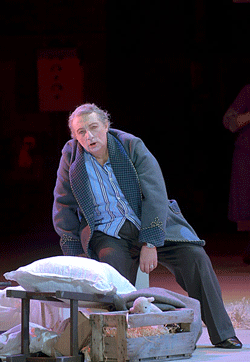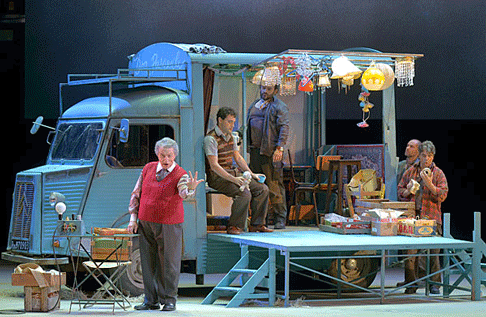Critics always show up on the first night but how
different will the third performance be on the Europe-wide channel Arte
“live” (well, with a few hours delay at 10:10 p.m. CET) from Paris’
ThÈ‚tre des Champs ElysÈes? After tomorrow it will be available on their
internet site, ARTE Live Web, and can
be streamed to computers around the world for the next six months or so.

Will you like the staging? For our jaded eyes, having old Don Pasquale
hawking cut-rate lighting fixtures out of the back of an old CitroÎn truck did
not please. With our extensive opera-going history — part of the job — we
have seen this kind of “update” so often before it seems a bit of a
clichÈ. You might like the refreshing change from the beige, overstuffed
furnishings he is normally surrounded with in traditional productions. Now a
hardscrabble salesman, he still retains his sense of privilege by having the
costumes for this production the work of Christian Lacroix and his suit, seen
from the eyes of 1950’s Italy, has him sartorially splendid. The other major
plus is that he is sung by the veteran Allessandro Corbelli and it would be
hard to imagine another baritone today that could so effectively inhabit these
clothes and so richly portray this delicious role.

The director, Denis PodalydËs, a regular at the ComÈdie-FranÁaise, here
stages his second opera and the characters had carefully defined roles but he
stuck with the traditional path of “opera buffa” with its broad gestures
and overwrought emotions. The old man contracts to marry to smash the hopes of
the nephew in his charge for an inheritance but the story has an old man
emotionally swept away with the possibility of a new love in his life, from
which he is brutally brought down. The young tenor Francesco Demuro, a name to
note, is similarly wrought with passion for the young girl his disinheritance
bars him from having. The flouncing free-spirited character of Norina rejects
the contract of obeisance with a persistent broad brush. There is more detail
to be mined in this story but new eyes watching this masterpiece of the genre
for the first time will find the opera’s story clearly told with emphasis on
fun and contrast.
Singing, in addition to the splendid Don, was at a high level. Italian tenor
Francesco Demuro gets he first big aria, “Sogno soave e casto,” in the
first minutes of the opera and there was a vague unease and occasional
imprecise intonation we did not see later where his voice was rich in color and
pleasing to the ear. With tonight’s performance, very likely, you will likely
hear more assured and free delivery. Soprano DÈsirÈe Rancatore has
recently developed into a serious star and, forced high notes excepted, gives a
near-perfect reading of the self-assured girl, and, like her tenor lover, is
young and appealing in the role. A very strong reading of Malatesta by Gabriele
Viviani completes a exceptional vocal quartet.
The Orchestre National de France, one of France’s top orchestras, was in
the pit and onstage was the excellent Radio France Choir. The dynamic conductor
Enrique Mazzola, on opening night, did not have the orchestra’s undivided
attention and attacks were imprecise. Later the orchestra seemed to warm up to
their job and played with more care. The choir, wearing what Lacroix imagines
locals were wearing at that time, had no trouble finding their volume or
enthusiasm. The story, despite the reservations, was clearly told and the
singing was generally engaging. After a dismal opera season so far in Paris
even a modest success is more than welcome. If you have access to the internet
distribution, it is recommended.
Frank Cadenhead
image=http://www.operatoday.com/Don-Pasquale_Paris_01.gif
image_description=Photo by Vincent Pontet
product=yes
product_title=Don Pasquale at the ThÈ‚tre des Champs ElysÈes
product_by=By Frank Cadenhead
product_id=Photos by Vincent Pontet
Don Pasquale at the ThÈ‚tre des Champs ElysÈes
Critics always show up on the first night but how
different will the third performance be on the Europe-wide channel Arte
“live” (well, with a few hours delay at 10:10 p.m. CET) from Paris’
ThÈ‚tre des Champs ElysÈes? After tomorrow it will be available on their
internet site, ARTE Live Web, and can
be streamed to computers around the world for the next six months or so.
Will you like the staging? For our jaded eyes, having old Don Pasquale
hawking cut-rate lighting fixtures out of the back of an old CitroÎn truck did
not please. With our extensive opera-going history — part of the job — we
have seen this kind of “update” so often before it seems a bit of a
clichÈ. You might like the refreshing change from the beige, overstuffed
furnishings he is normally surrounded with in traditional productions. Now a
hardscrabble salesman, he still retains his sense of privilege by having the
costumes for this production the work of Christian Lacroix and his suit, seen
from the eyes of 1950’s Italy, has him sartorially splendid. The other major
plus is that he is sung by the veteran Allessandro Corbelli and it would be
hard to imagine another baritone today that could so effectively inhabit these
clothes and so richly portray this delicious role.
The director, Denis PodalydËs, a regular at the ComÈdie-FranÁaise, here
stages his second opera and the characters had carefully defined roles but he
stuck with the traditional path of “opera buffa” with its broad gestures
and overwrought emotions. The old man contracts to marry to smash the hopes of
the nephew in his charge for an inheritance but the story has an old man
emotionally swept away with the possibility of a new love in his life, from
which he is brutally brought down. The young tenor Francesco Demuro, a name to
note, is similarly wrought with passion for the young girl his disinheritance
bars him from having. The flouncing free-spirited character of Norina rejects
the contract of obeisance with a persistent broad brush. There is more detail
to be mined in this story but new eyes watching this masterpiece of the genre
for the first time will find the opera’s story clearly told with emphasis on
fun and contrast.
Singing, in addition to the splendid Don, was at a high level. Italian tenor
Francesco Demuro gets he first big aria, “Sogno soave e casto,” in the
first minutes of the opera and there was a vague unease and occasional
imprecise intonation we did not see later where his voice was rich in color and
pleasing to the ear. With tonight’s performance, very likely, you will likely
hear more assured and free delivery. Soprano DÈsirÈe Rancatore has
recently developed into a serious star and, forced high notes excepted, gives a
near-perfect reading of the self-assured girl, and, like her tenor lover, is
young and appealing in the role. A very strong reading of Malatesta by Gabriele
Viviani completes a exceptional vocal quartet.
The Orchestre National de France, one of France’s top orchestras, was in
the pit and onstage was the excellent Radio France Choir. The dynamic conductor
Enrique Mazzola, on opening night, did not have the orchestra’s undivided
attention and attacks were imprecise. Later the orchestra seemed to warm up to
their job and played with more care. The choir, wearing what Lacroix imagines
locals were wearing at that time, had no trouble finding their volume or
enthusiasm. The story, despite the reservations, was clearly told and the
singing was generally engaging. After a dismal opera season so far in Paris
even a modest success is more than welcome. If you have access to the internet
distribution, it is recommended.
Frank Cadenhead
image=http://www.operatoday.com/Don-Pasquale_Paris_01.gif
image_description=Photo by Vincent Pontet
product=yes
product_title=Don Pasquale at the ThÈ‚tre des Champs ElysÈes
product_by=By Frank Cadenhead
product_id=Photos by Vincent Pontet